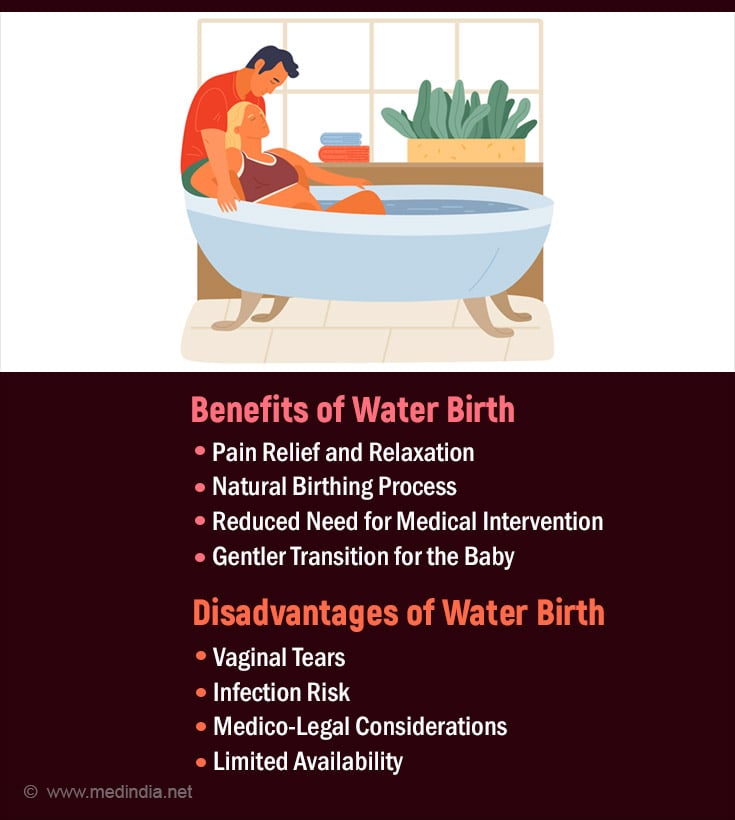- Waterbirth: a national retrospective cohort study of factors associated with its use among women in England - (https://pubmed.ncbi.nlm.nih.gov/33771115/)
- Water birth, more than a trendy alternative: a prospective, observational study - (https://pubmed.ncbi.nlm.nih.gov/16868755/)
- A Discrete Choice Experiment on Women's Preferences for Water Immersion During Labor and Birth: Identification, Refinement and Selection of Attributes and Levels - (https://pubmed.ncbi.nlm.nih.gov/32188019/)
About
Water birth is gaining popularity as an alternative birthing method across the globe, including India. It involves labor and delivery in a warm water immersion environment, typically in a specially designed birthing pool. Advocates of water birth tout its numerous benefits for both mothers and babies, including pain relief, relaxation, and a more natural birthing process. However, like any medical procedure, water birth also comes with its own set of considerations and potential risks(1✔ ✔Trusted Source
Waterbirth: a national retrospective cohort study of factors associated with its use among women in England
Go to source).
Understanding Water Birth
Water birth is a natural birthing method where the mother spends the first stage of labor immersed in warm water. The buoyancy of the water helps relieve pressure on the body, allowing for easier movement and decreased discomfort during contractions. Warm water immersion has been shown to trigger the release of endorphins, which can help ease labor pain and promote relaxation(2✔ ✔Trusted Source
Water birth, more than a trendy alternative: a prospective, observational study
Go to source).
Benefits of Water Birth
- Pain Relief and Relaxation: Warm water immersion during labor can significantly reduce pain and promote muscle relaxation, making the birthing process more manageable for the mother.
- Natural Birthing Process: Water birth is often considered a more natural alternative to traditional hospital births, allowing the mother to feel more in control of her labor and delivery experience.
- Reduced Need for Medical Intervention: Some studies suggest that water birth may reduce the need for medical interventions such as epidurals or synthetic oxytocin to induce labor.
- Gentler Transition for the Baby: Babies born in water may experience a gentler transition from the womb to the outside world, as they are born into a warm and soothing environment.
Did You Know?
Did you know that water birth offers natural pain relief? Warm water immersion triggers the release of endorphins, significantly alleviating labor pain without the need for medication.
Water Birth: Risks and Disadvantages
- Vaginal Tears: One of the concerns associated with water birth is the increased risk of vaginal tears or perineal trauma due to the slippery environment.
- Infection Risk: There is a potential risk of infection for both the mother and the baby if the birthing pool is not properly maintained or if hygiene protocols are not followed.
- Medico-Legal Considerations: In India, water birth is still a relatively new concept, and there may be medico-legal issues surrounding its practice, including liability concerns for healthcare providers.
- Limited Availability: Not all hospitals or birthing centers in India may offer water birth as an option, limiting access for interested mothers.
Water Birth: Safety Considerations
While water birth can be a safe option for many women, it's crucial to ensure that certain safety guidelines are followed(3✔ ✔Trusted Source
A Discrete Choice Experiment on Women's Preferences for Water Immersion During Labor and Birth: Identification, Refinement and Selection of Attributes and Levels
Go to source):
- Temperature Control: The water temperature should be carefully monitored and maintained between 37-38°C to prevent overheating or hypothermia for both the mother and the baby.
- Hygiene Protocols: The birthing pool should be thoroughly cleaned and disinfected before each use to minimize the risk of infection.
- Medical Supervision: A qualified healthcare provider experienced in water birth should be present throughout the labor and delivery process to monitor the mother and the baby's well-being.
Did You Know?
Did you know that babies born in water experience a gentler transition into the world? Born into a warm and soothing environment, water birth may reduce stress for newborns during delivery.Water Birth: Cost and Accessibility
The cost of a water birth within a hospital setting may indeed be comparable to that of a traditional vaginal birth. Generally, health insurance policies cover a portion, if not all, of the hospital birthing expenses.
In the United States, the expense of a vaginal birth at a hospital, without insurance coverage, typically falls within the range of $5,000 to $10,000. However, costs can vary significantly depending on the geographical location and the specific medical facility.
Home birth expenses fluctuate depending on the location but tend to be lower compared to hospital births. The cost of a home birth typically ranges between $1,500 and $5,000. It's worth noting that home births are often not covered by insurance. Therefore, it's essential to inquire about the full breakdown of expected costs and clarify payment terms with the midwife before finalizing the decision to use their services.
In India, the cost of a water birth ranges from 80,000 to 1,50,000 INR. This variation in cost depends on factors such as the location, facilities provided, and the expertise of the medical professionals involved. As with any medical procedure, it's advisable to thoroughly research and consider all financial implications before opting for a water birth, ensuring that the chosen option aligns with both budgetary constraints and personal preferences.
Summary
Water birth offers a unique and potentially beneficial birthing experience for expectant mothers seeking a more natural approach to labor and delivery. However, it's essential to weigh the benefits against the potential risks and ensure that the necessary safety precautions are in place.
As more evidence accumulates on the science and safety of water birth, it is hoped that this alternative birthing method will become more widely accessible and accepted in India's healthcare system.
By staying informed and discussing options with healthcare providers, expectant mothers can make informed decisions about their birthing experiences, whether opting for water birth or traditional delivery methods.
 MEDINDIA
MEDINDIA

 Email
Email









